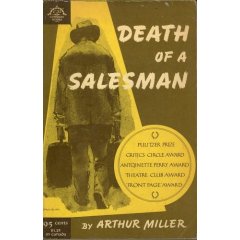
Death of a Salesman by Arthur Miller
Classic Literature/Drama
Finished on 9/26/06
Rating: B- (5/10 Fair)
If someone said to me,
How did you spend your life?
I’d have to say,
Lying on the sofa reading.
~Fran Lebowitz
That’s me! My favorite place to read is stretched out on our sofa, propped up with a pillow or two, burrowed under a quilt, with only the background music of neighborhood children quietly (and sometimes, not so quietly!) playing in their front yards. Pure bliss.
Someone once asked me why I like to read so much. That’s like asking why one breathes. I’ve always enjoyed reading and have become hopelessly addicted to the pastime.
For the most part, I read for the simple enjoyment of losing myself to another world, another time, another’s life. I love a beautiful turn of phrase or the way in which an author captures my own personal feelings about a subject, reflecting a thought or belief of mine as if they’d peeked inside my mind or heart.
But occasionally, I’ll choose to read something out of my comfort zone in order to educate myself. The subject matter doesn’t necessarily have to be nonfiction, although I do I have a keen interest in World War II and am drawn to books dealing with that time period. What I’m referring to, however, is an effort to educate myself about works of literature that seem (at least to me) to be a part of the literary subconscious or classic canon; in a case like this, I read so that I can understand and recognize characters or events referenced in other works. In other words, I read so that I can take part in the enjoyment of that canon, so that I can be a part of that literary subconscious. (A small part, to be sure, but a part, nonetheless.)
Ishmael. Scout. Scarlett. Tom Joad. Polonius. Most are familiar with these literary icons. One of the reasons I decided to spend a month devoted to reading nothing but classic literature was to educate myself about some of the literary works and characters that I’d been hearing about for several decades.
Until last week, I didn’t know who Willy Loman was. Other than the title, I knew nothing about Arthur Miller’s Pulitzer Prize-winning drama, Death of a Salesman. Plays (and poetry) tend to gravitate to the bottom of my reading list (if they make it on the list at all). However, this book caught my eye as I was perusing our shelves for books to include in my Classic Challenge. It didn’t seem too intimidating, so I threw it in the pile. What could go wrong?
Well, at least it’s a short play, easily read in a day or two. Unfortunately, it’s quite bleak and depressing. Once I was able to sort out Willy’s hallucinations (early Alzheimer’s or dementia?) from reality, the story was pretty straightforward. Grim, but straightforward: Is that all there is? You work at a meaningless job, raise your meaningless family...and then you die? Yikes. However, I feel like I missed something and wish I had read it in college where I could benefit from a professor’s analysis and class discussion. I suppose there’s always Cliffs Notes, should I get inspired to read more about Willy’s plight.
From The Merriam-Webster Encyclopedia of Literature:
A play in "two acts and a requiem" by Arthur Miller, written in 1948 and produced in 1949. Miller won a Pulitzer Prize for the work, which he described as "the tragedy of a man who gave his life, or sold it" in pursuit of the American Dream. After many years on the road as a traveling salesman, Willy Loman realizes he has been a failure as a father and husband. His sons, Happy and Biff, are not successful--on his terms (being "well-liked") or any others. His career fading, Willy escapes into reminiscences of an idealized past. In the play's climactic scene, Biff prepares to leave home, starts arguing with Willy, confesses that he has spent three months in jail, and mocks his father's belief in "a smile and a shoeshine." Willy, bitter and broken, his illusions shattered, commits suicide.

Les, I don't know how I missed your Classics Challenge. You've almost read that whole list and school's only been going a month. Way to go!
ReplyDeleteLes, this is such a sad play, but so wonderful, and really a good use for the word "classic". It confirms one of my beliefs that this kind of work, like Bergman's movies, are for the young, who can take it. :<) The things I read 35 years ago, I wouldn't touch now. I know more of life now. Then I wanted to know more. (if that makes any sense).
ReplyDeleteNan
Thanks, Booklogged. I'm finished with the challenge now. I decided to only spend a month on it. I'll post a summary of how it went in the next day or two.
ReplyDeleteNan, I understand what you are saying. I wonder how I'll like the actual play. It arrived from Netflix yesterday.